2014 Farmers Weekly Poultry finalists revealed
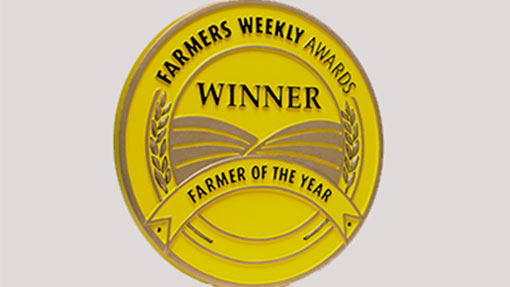
The egg and poultrymeat sectors have faced numerous challenges in recent years, from rising production costs to supermarket price wars.
But the three finalists in this year’s competition have risen above them. Philip Clarke reports.
Nick and Claire Bragg, Nettlecombe, Frogmary Green Farm, Somerset
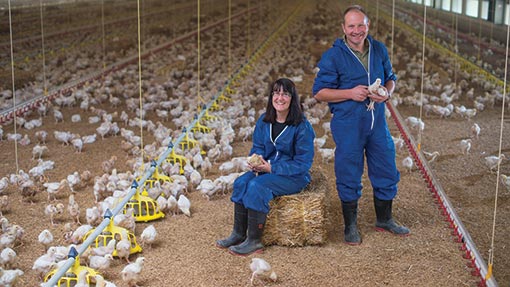
Nick and Claire Bragg have a passion – something that is as rare as hen’s teeth in the broiler sector. And that is they like to open their gates to the general public – not just occasionally, but on a regular basis.
Some would regard this as high risk. But the Braggs see it as a crucial part of securing the long-term market, and ensuring consumers are better informed about the food they eat. Besides, they are so proud of what they do, they are just bursting to tell people all about it.
To this end, they installed a special viewing window when their newest shed was erected in 2012, describing it as a “fantastic asset” which does not compromise biosecurity.
“Sadly, the view still held by some of the general public is that broiler chickens are caged and kept in dark houses,” says Claire. “It is extremely rewarding to hear the surprised comments when they see for themselves, and their preconceived ideas are changed for the good.”
As well as being established participants in Open Farm Sunday and Open Farm School Day, the Braggs also regularly host other schools, local interest groups and customers. “Sometimes we arrange for the same class to visit twice, so they can see the chicks and then return to see how quickly they have grown,” says Claire.
The couple also make themselves available for numerous TV programmes and other media work, including appearances on BBC’s Countryfile and videos for Freedom Food.
And they have held various technical meetings for farmers, for example workshops on broiler ventilation, bedding, biomass heating and IPPC controls.
FARM FACTS
- Poultry, arable and contracting business on 200ha with four full-time staff
- 102,000 Freedom Food and 32,000 Red Tractor broilers
- Biomass boiler, with plans for AD plant
Commercial farming
Frogmary Green Farm may be something of a showcase unit – it has recently been launched as a Leaf demonstration farm – but that is not to suggest it is anything other than highly commercial.
All birds are grown on a rolling two-crop contract to Hook 2 Sisters, and production has expanded significantly over the past five years – from four sheds producing 375,000 birds a year in 2009 to six sheds producing 835,000 birds a year in 2014, across various sites.
“When we start a new project, we work on the basis that we want to have the most up-to-date equipment available,” says Nick. “While this incurs heavy upfront costs, it proves to be more efficient, while creating the best environment to rear quality birds, which ultimately results in profit.”
A similar approach was taken with an old pullet rearing shed, which became available to rent about two miles away in 2011.
It seemed like too good an opportunity to miss and having, invested £65,000 re-equipping it for broilers, it now houses the 32,000 Red Tractor birds.
The additional houses have enabled the Braggs to take on a young stockman and help spread costs. But they are always looking to develop and expand their business and have already upped their IPPC coverage from 200,000 birds to 300,000 birds, with plans for another three large sheds over the next five years.
They are also planning to install a 1MW anaerobic digester plant, using a feedstock of poultry manure and stockfeed potatoes, to produce electricity for the farm and national grid.
The open farm approach is undoubtedly helpful in terms of getting planning permission for such ventures. “Several local councillors have been up here, so they know what we are about,” says Nick. “We always go the extra mile in ensuring our buildings have minimal impact, using wood and natural stone to make sure they blend in.”
Open channels
As well as operating to high environmental standards, the Braggs also ensure they maintain a regular dialogue with their customers.
“We are a member of the Sainsbury’s Chicken Development Group, regularly attending meetings with their purchasing and quality teams to ensure an understanding of the pressures each party is under,” they say.
In 2013, Frogmary Green Farm was selected as a Sainsbury’s “concept farm”, which will be used to undertake work as part of a joint exercise to raise standards.
“Being a concept farm means that we lead the way in good agricultural practice, are progressive and open minded to change, and are in line with new ideas and technologies,” says Nick.
David and Helen Brass, The Lakes Free Range Egg Co, Penrith, Cumbria
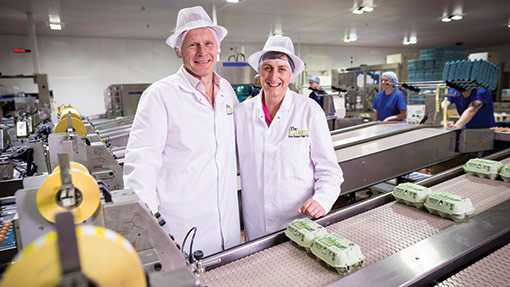
As an ex-RAF serviceman, it is no surprise to find that David Brass is a man who likes targets.
These days they are mostly commercial and environmental ones, with his Lakes Free Range Egg Co aiming to double turnover in the next two years.
That seems like quite an ask. But the company’s track record of growth is impressive, having taken egg sales from £500,000 to £10m in its first decade, and then more than doubling it again to £25m in the seven years since.
David and Helen’s own farm has expanded from about 9,000 hens on 20ha in 1995 to a current flock of 100,000 hens on 100ha. In addition, they have taken on a number of contracted producers, giving a total free-range flock of 650,000 hens.
This growth has, to a large extent, been brought about by developing strong relationships with key customers, including McDonald’s and most of the major retailers. “These businesses share our ethos for animal welfare and environmentally friendly, sustainable farming,” says David.
Sales have also been boosted by the development of key strategic brands, including Nature’s Nest with Morrisons – its premier national free-range brand, with 1p/pack spent on woodland projects. It also launched Laid With Love in Booths in 2011, with another 1p/pack going to cancer research. “And in 2013, we became own label suppliers to Sainsbury’s, who also stock our Lakes brand.”
FARM FACTS
- 100,000 owned layers and 550,000 contracted
- 50,000 pullets reared each year
- Packing centre handling over 200m eggs a year
Environmental awareness
These brands are underpinned by the company’s total focus on ethical production and environmental responsibility. “We do not want to produce just another free-range egg, but one that says something about who we are,” says David.
Tree planting is seen as especially important, both in terms of bird welfare and carbon capture. And to ensure a pleasing visual effect, trees are now planted in curves, rather than straight lines.
Contracted producers are also expected to play their part. According to the protocols, birds must be selected from breeds that are suitable for free ranging and each farm has to have its own biodiversity action plan.
There is also a requirement to plant at least 20% of the range with indigenous trees, while all sheds must be naturally ventilated to reduce energy consumption.
As well as benefiting the environment, this all helps the bottom line, with each flock averaging 312 eggs a bird, generating a 12.5% higher margin than the national average over the past seven years.
“Half our producers are on small family hill farms on severely disadvantaged land,” says David. “Supporting profitability and creating a living on these farms encourages younger generations to return to farming.”
It is also notable that The Lakes offers its suppliers unique five-year contracts, holds regular producer days and operates buying groups for feed, veterinary services and cleaning products, to help everyone contain costs.
Innovative approach
The company is also highly innovative, having developed a state-of-the-art packing centre in 2011 to cope with its expanding sales.
Designed by David himself, the building has numerous features to improve efficiency and protect the environment. These include ground-source heating to warm the building in winter and cool it in summer, movement-sensitive LED lighting, rainwater recycling, laser technology to avoid the need for labels, and robotic packing.
There are more than 500 solar panels on the roof generating 100kW, while a new biomass boiler uses wood waste and tree thinnings to produce heat for the factory and other buildings.
The packing centre cost £3m in 2011, with 25% directed to environmental gains. It is expected to achieve carbon neutrality later this year.
David has also worked closely with Bristol University to develop a new pullet-rearing facility for 20,000 chicks at a time.
“This is a dark brooding system, which emulates brooding under a hen,” he says. With a biomass boiler, underfloor heating and natural lighting, he reckons the unit uses 90% less energy than a conventional pullet shed.
“Results so far are impressive, with more active pullets that are better feathered, with improved bone strength and more mobility. They are better suited to free range.”
Given the company’s targets for growth, it is no surprise to learn that David is planning on putting up three more of these units in the near future.
Rebecca Tonks, St Ewe Free Range Eggs, Ventonwyn Farm, Cornwall
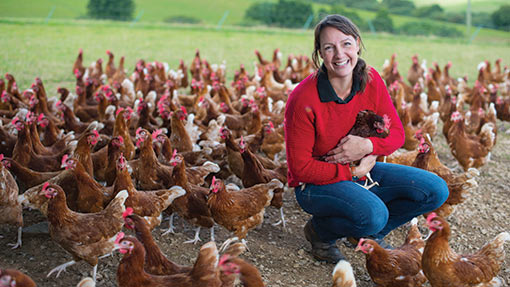
When it comes to egg branding and marketing, St Ewe Free Range Eggs punches well above its weight.
Tucked away in a well-hidden corner of Cornwall, with just 40,000 owned and contracted hens, the family business was originally contracted to Noble Foods. But the push by major supermarkets for regional producers in 2007 created an opportunity that Rebecca was all too keen to grab.
“We handed in our one year’s notice with Noble and, 364 days later, were awarded a contract with Sainsbury’s,” she recalls.
Branding
The first product was the St Ewe Free Range Egg, presented in a bright blue box with a seaside feel to the imagery. While it is clearly a regional brand, Rebecca says she was keen to make sure it was not specifically Cornish, so as not to limit its potential.
As well as widespread distribution across the independent trade in the South West, the brand now has listings in Asda, Tesco, Sainsbury’s and Morrisons. “It is still selling really well, even after seven years.
“But our marketing effort has become much more refined and dynamic as we try to minimise the impact of feed cost inflation,” Rebecca adds. “We keep in close communication with the supermarkets. They have understood and been supportive of necessary price rises when they are communicated in a timely fashion with clear rationale.”
St Ewe has also diversified its range, in particular adding a selenium-enriched product – Boost the Roost eggs – to tap into the health food market.
FARM FACTS
- 28ha with 14,500 Lohmann Brown layers in four sheds
- Grading eggs five days a week
- Three partner farms with another 25,500 birds
This derived from a family illness, which prompted Rebecca to look into the therapeutic properties of selenium. “As we investigated selenium, it became clear that changes in the wheat used for breadmaking has left the British diet deficient in this vital micronutrient.”
The hens on the home farm, and on one of the contract farms, are now fed an organic selenium supplement (Sel-Plex from Alltech), which transfers to the egg, and then to the consumer.
Again, much care and attention has gone into the design of the packaging, working with Cornwall Food and Drink to produce eye-catching coral pink boxes with the strapline “Our healthy hens, your healthy family”. “This unique proposition has enabled us to set a premium price point without increasing the cost of production significantly,” says Rebecca.
Boost the Roost is also backed up with its own website – separate to the St Ewe website – and extensive use is made of social media to raise awareness.
The product is now listed in more than 100 Tesco and Asda stores and is already trading in a wider geographic area than the established St Ewe range.
And it does not end there. Having covered the regional market and the health food market, the business has also recently launched its “Hen Picked” range, aimed at the “£1 for six” price point for more cash-strapped consumers. St Ewe also packs eggs for The Black Farmer range, which goes into Ocado. “This spectrum of products defrays the risk of overexposure to one market,” says Rebecca.
Management
As well as canny marketing, the Tonks family is always keen to look after and develop its staff and producer partners.
“Although we operate a lean operation, we have added several new and part-time roles, including a packing centre manager and a farm manger – both promoted from within. We believe in local employment, sustainable jobs and staff development.”
There are three other producer partners, who all operate to the same standards, with another two lined up. By next spring it is envisaged that the business will have 68,000 free-range hens.
“We work incredibly closely with our partner producers and believe vehemently that our model is a way of bringing stability and sustainability to family farms.”
The Tonks also take their environmental responsibilities seriously. For example, all egg boxes use recycled card, while there is no plastic shrinkwrapping of pallets.
All major deliveries are back-hauled to reduce the distribution carbon footprint. And they have invested in an 80kW solar panel system, making the packing centre self-sufficient in electricity.
As for the future, Rebecca has a clear vision – to keep growing throughput by taking on more farmers, to add more innovative egg brands to the range and to set an example for other independent eggs producers to follow.
Sponsor’s message
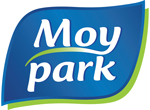 “Moy Park understands the dedication, commitment and passion required to succeed in the poultry sector. In this regard each of the finalists has demonstrated industry leading, sustainable best practice. We would like to congratulate them.”
“Moy Park understands the dedication, commitment and passion required to succeed in the poultry sector. In this regard each of the finalists has demonstrated industry leading, sustainable best practice. We would like to congratulate them.”
Alan Gibson
Agriculture and fresh poultry director
Find out more about the 2014 Farmers Weekly Awards
